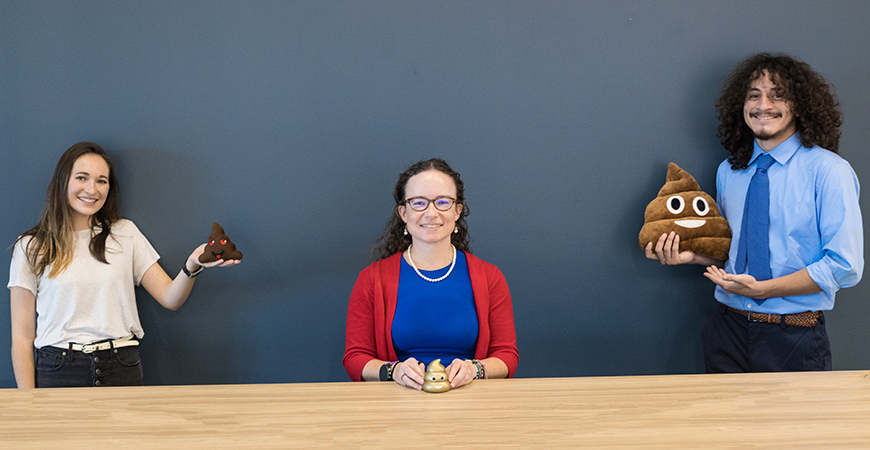
After the COVID-19 pandemic struck, scientists across the globe realized they could track the virus by testing sewage water. School of Engineering Professor Colleen Naughton pioneered a dashboard to host the global findings.
One way Naughton finds who and where wastewater research is being performed? Twitter.
Naughton created the comical Twitter handle CovidPoops19, where she and her team of researchers tweet findings on COVID-19 and SARS-CoV-2, the scientific name of the virus that causes COVID-19. Cities and universities across the globe began testing wastewater and posting the results once scientists realized it could be an indicator of future COVID-19 outbreaks. Naughton’s lab finds the latest information on Twitter and in publications, news articles and webinars and adds it to the CovidPoops19 dashboard.
It may sound funny to some, Naughton said, but she has always had a passion for water and wastewater. She focused her studies on these topics in undergraduate work before later building latrines in the Peace Corps. As a civil engineer in the Environmental Systems graduate group, Naughton has spent much of her recent work studying the intersection of food, energy and water systems as well as sanitation and hygiene in developing communities.
“The pandemic is awful, but it made me want to help and apply my expertise,” Naughton said. “It is a good thing that we are able to monitor community spread in this way.”
The dashboard was made possible through an emergency seed grant from the Center of Information Technology Research in the Interest of Society (CITRIS). Naughton also recently received funding through Michigan State University and the Bill & Melinda Gates Foundation to continue the work. A preprint about the dashboard was also recently published in Medrxiv.
Naughton’s lab plots the information collected on Twitter and through other avenues on the CovidPoops19 dashboard to provide a global map of where wastewater testing is taking place to inform the public. The dashboard is an aggregate of all public wastewater information available, which to date includes 70 other dashboards, 248 universities, 53 countries and 2,082 sites.
Naughton’s lab created a map using ArcGIS, a geographic information system that allows researchers to plot the coordinates where testing occurs. Users can zoom in to find which places are testing wastewater and click on towns or universities, revealing a link to their respective websites with findings.
Three students were instrumental in working on this project with Naughton, who estimates they collectively spend at least a combined 40 hours a week finding and plotting the data.
“I have learned so much through this project, but the biggest takeaway is the importance of science communication and the utilization of social media,” Arianna Tariqi said, a fourth-year environmental engineering major in Naughton’s lab. “I have never been very active on social media, but through this project I found a community of academics who have done a wonderful job of getting their research message across globally. It has been inspiring to see the work that our research group has done reach the eyes and ears of so many around the world.”
“My main takeaway was seeing first-hand how international science cooperation works, and that it’s truly doable,” first-year doctoral student Ana Grace Alvarado said.
Wastewater monitoring allows scientists to test an entire group of people for COVID-19, not just one person at a time. It has also been shown to be effective at predicting outbreaks of COVID-19 by two to 14 days — but is not considered a replacement for testing or vaccinations. Many cities, universities and countries adopted this testing approach and by sharing their results reinforced the value of Naughton’s dashboard, which illustrates the global fight against COVID-19 and the interconnectedness of the world.
“Through meeting many different wastewater scientists around the world, monitoring global SARS-CoV-2 sewage monitoring efforts, and with frequent support from my lab members, including Professor Naughton, I have learned the value of collaboration and encouragement,” fourth-year engineering student Fernando Adali Roman, Jr. said. “Regardless of social distancing and lockdown measures, I have always felt very connected with the members of my lab, along with engineers around the world trying to help.”






